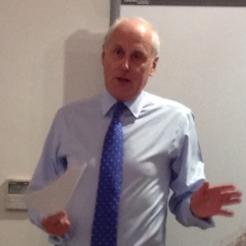Small charities have been the losers in the Hodgson review of the Charities Act, says Pauline Broomhead. From making it easier for large charities to pay for trustees to raising the limit for charities having to register with the Charity Commission.
I keep hearing that bigger is better when it comes to charities and, you know, I don’t really see that as the case. Do we really want to create a two-tier system of charity trustees? Lord Hodgson’s review of the Charities Act 2006 suggests we might.
The proposal that people who volunteer as trustees for large charities should - or could - be paid for their services prompts the question of why individuals volunteer to become trustees for charities. I believe that they have deep-seated motivations for doing so. They feel passionate, outraged or inspired by the issue the charity addresses or they have an affinity through personal experience. Trusteeship is a vocation, a calling. Receiving payment puts it firmly into the realms of a ‘profession’.
Smaller charities would not have the ability or the resources to pay trustees. Does this mean that their trustees are ‘less professional’ in their governance? Could the trusteeship of a small charity be perceived as less attractive even though their inability to pay trustees means they retain the true spirit of trusteeship? We don’t want a system like that of the private sector in which there are ‘jobs for the boys’ with regards to non-exec directors. If we start to see this in the charity sector we must stamp it out. We need trustees who align with the mission, vision and values of our organisations.
A further part of the report that could have a significant impact on small charities is the suggestion that trustees should only serve for three years, with the opportunity to renew. In principle this sounds great. We should all renew and refresh our trustee boards. In reality, trustees of many small charities (which are often formed by individuals who become founding board members) will wish to remain for the longer term. Also small charities working in geographically small locations may not have the opportunity or trustee talent pool to make a quick turnover work for them.
£25,000 threshold poses real problems
The real issue for me is the raising of the general threshold for compulsory registration with the Charity Commission to £25,000. It poses real problems for small charities. In my experience small charities already rush towards registration and for good reason – they need to demonstrate their credibility to funders and the general public.
Small charities which raise less than £25,000 per annum are no different from larger organisations. The work they do is vital, it is undertaken with the same passion, same determination, and is as relevant as larger organisations. So why should they be treated differently? Small charities need the same levels of scrutiny to be on them in order to maintain public trust.
Fees and fines could put small charities out of business
There two key recommendations that really do seem punitive. First, charging for registration; small charities are charged, charged and charged again – for membership of umbrella organisations, for membership of regulating bodies and it goes on. There could conceivable be a time when the payment for what we perceive to be the necessary infrastructure through which to operate cripples the fledgling charity before it really starts. Adding another membership or fee by the Charity Commission is just adding yet another layer of expenditure to a charity making it even more difficult for them to spend the majority of their income on their beneficiaries. I’m not of the mind that small charities should pay a series of fees to the regulators and other bodies for the right to exist rather.
With regard to the proposal to fine charities which file their accounts late, do we really believe that the right response to this is the withdrawal of the right to reclaim gift aid? This is punitive and could hurt the service delivery of smaller organisations that rely on gift aid income.
And, quite frankly speaking as a donor, gift aid is collected by the charity as part of the gift they receive from the person who paid the tax on the income in the first place. It should not within the powers for that part of the gift to be held back unless there is also provision for the donor to reclaim that difference themselves.
We are not in the business of making life easier for the Charity Commission. We should be building a policy environment where it is easy for charities to do their work. The government recognises that business needs to be sent the message that Britain is a great place to do business. We need to do precisely the same thing with charity, we need to champion the sector, we need to reduce the burden that prevents a charity delivering its services and we need to promote philanthropy, and trusteeship is a form of philanthropy.
Lord Hodgson’s report seems to be playing devil’s advocate in keeping a balance between the sector, sector bodies like NCVO and the Charity Commission. It is a missed opportunity to champion the changes the sector needs to thrive. This time of austerity and low charity morale is not the time for pragmatism. We need a hero.
Pauline Broomhead is the chief executive of the Foundation for Social Improvement.









